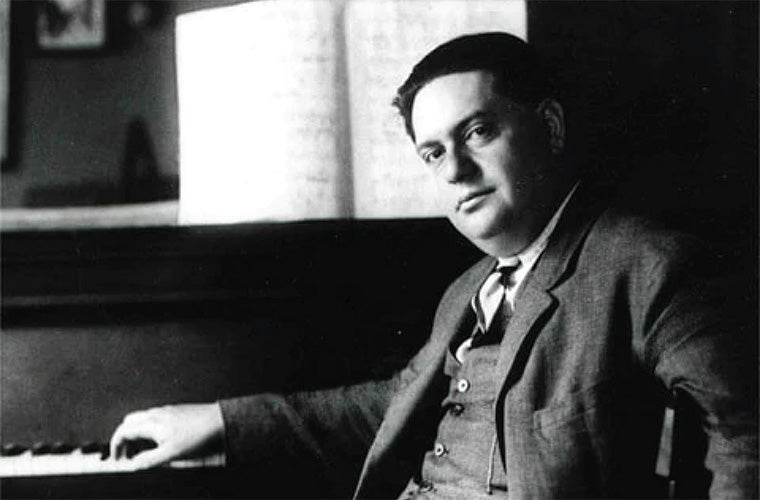
Darius Milhaud
1892 - 1974
Biography
Darius Milhaud once astonished a crowd at a Composers' Forum workshop. "A student composition had just been performed, and it was time for the discussion period. The poor student was barely fending off questions from a particularly vocal fellow composer who kept asking why he had done this or that, when there was a sudden commotion in one corner of the room, and Milhaud slowly raised himself out of a deep armchair. Silence fell as the students waited to hear a pronouncement from the master. ‘Why not?' Milhaud said, and sat down."
Milhaud's "why not" approach to composing was liberal in every sense. He offered the twentieth century an extraordinarily generous number of works – an opus of 443 pieces for orchestra, chamber ensemble, solo and duo piano, opera, solo voice and chorus, ballet, theater and film. In music as in life, Milhaud loved to experiment and explore, and maintained throughout his long and grand career a respectful unwillingness to be bound by tradition, swayed by fashion, or daunted by criticism. Milhaud's hundredth birthday year is a fitting time to celebrate his abundant musical offering, still strikingly fresh to the ear.
Milhaud's most popular works, the piano pieces Saudades do Brasil and Scaramouche and the ballets La création du monde and Le boeuf sur le toit, have never left the repertoire. Their variety and vitality may well appeal to modern listeners more than ever before. New performances and re-releases of these works on compact disc bring to the fore Milhaud's lyricism and tonality, his affection for rhythms, airs and instrumental colors drawn from popular and exotic sources, so in tune with the accessibility and eclecticism we prize today. Also reissued on disc are performances conducted or played by Milhaud himself, a touchstone by which to judge more recent interpretations.
Milhaud was born on September 4, 1892 in Aix-en-Provence, where his cultured and close-knit Jewish family had been settled for at least eight centuries. A sensitive child, Milhaud spent long hours walking, communing with the dramatic landscape Cézanne made famous in his paintings. Milhaud would later describe a recurring semi-mystical sensation he had in the countryside of Provence by night, the earth and sky sending overlapping rays and beams of energy, "a thousand simultaneous musics rushing towards me from all directions." He regarded this experience as the source of the polytonality which would later saturate his music with vibrant, overlapping bands of sound.
Milhaud's talent was apparent from an early age, and after his basic schooling he was sent to the Conservatoire de Paris, where his teachers included Dukas and Widor. His studies did not last long, as he soon began producing numerous works in his own inimitable voice. Rejected from military service in World War I for health reasons, he served for two years as secretary to the revered poet-diplomat, Paul Claudel, then ambassador to Brazil. Brazil became a source of inspiration second only to Provence in Milhaud's musical development. After the war, he joined the lively artistic scene in Paris, and soon became associated with five other young composers in a loose band known as "Les Six." In 1925, he married his first cousin, the actress and writer Madeleine Milhaud. For the rest of Milhaud's life, Madeleine would be a valued creative partner and devoted companion, caring for him in his chronic struggle with crippling rheumatoid arthritis.
Driven from France by the Nazi invasion, Milhaud and his family were welcomed in America, where he would have lasting personal ties and creative influence. He was soon ensconced in Oakland, California, where he joined the faculty of Mills College. An enormously popular and influential teacher, Milhaud alternated year-long residencies at Mills and at the Conservatoire in Paris throughout the last thirty years of his life, also frequenting the summer music festivals at Aspen and Tanglewood, and lecturing regularly at Santa Barbara. Among his best-known students were William Bolcom, Dave Brubeck, Philip Glass and Steve Reich. Unlike so many teachers who try to perpetuate their own style through their students, Milhaud sought out the best qualities his pupils' music already possessed, and helped them to maximize their own inherent strengths. Thus Milhaud's enduring influence in the development of current musical trends is felt more than seen, an enabling spirit not housed in a "school."
By nature social and collaborative, the genial Milhaud shared ideas and affinities with almost everyone in the artistic world of his day, among them Satie, Stravinsky, Diaghilev, his fellow "Les Six" members, Poulenc, Honegger, Auric, Tailleferre and Durey; Paul Hindemith and Kurt Weill; painters André Derain, Raoul Dufy and Fernand Léger, and the writers Gide, Malraux, Desnos, Anouilh, and Claudel. But while Milhaud always found appreciation among his fellow artists, critics often failed to take his work seriously, and Milhaud feared he would be dismissed as a lightweight, a mere "strolling player." The sophistication of Milhaud's polytonal textures notwithstanding, his music makes a straightforward appeal to the ear and heart. The qualities he sought in his students' work were evident in his own — "charm, gaiety, and fierceness." He cautioned young composers against what he called "overdevelopment" in the name of the profound. "It is false," he insisted, "that the profundity of a work proceeds directly from the boredom it inspires."
Although Milhaud was an early advocate of Schoenberg (he gave the first Paris performance of Pierrot Lunaire) his lifelong impatience with systems and orthodoxies, old or new, deflected him from adopting twelve-tone technique. Instead, Milhaud developed a personal musical language which is never obscured despite the almost limitless variety of moods and locales he evokes. His ballets and piano music inspired by time spent in Brazil and Harlem have an irresistible jazziness. Paris and his native Provence are lovingly recalled in some of his more lyrical passages. Milhaud's ferocious dramatic music based on subjects from Greek tragedy, his tender depictions of domestic joy, and moving memorials to his dead come as a surprise amid the ebullience that pervades most of his work. Throughout the extraordinary range and depth of Milhaud's output, his distinct voice remains tonal and direct – intelligent, and intelligible even to the uninitiated. This voice is compellingly present in the array of new compact discs surveyed in this discography.
Featured Events
An American in Paris
- EscalesIbert
- Piano Concerto for the Left HandRavel
- La création du monde (The Creation of the World)Milhaud
- An American in ParisGershwin
